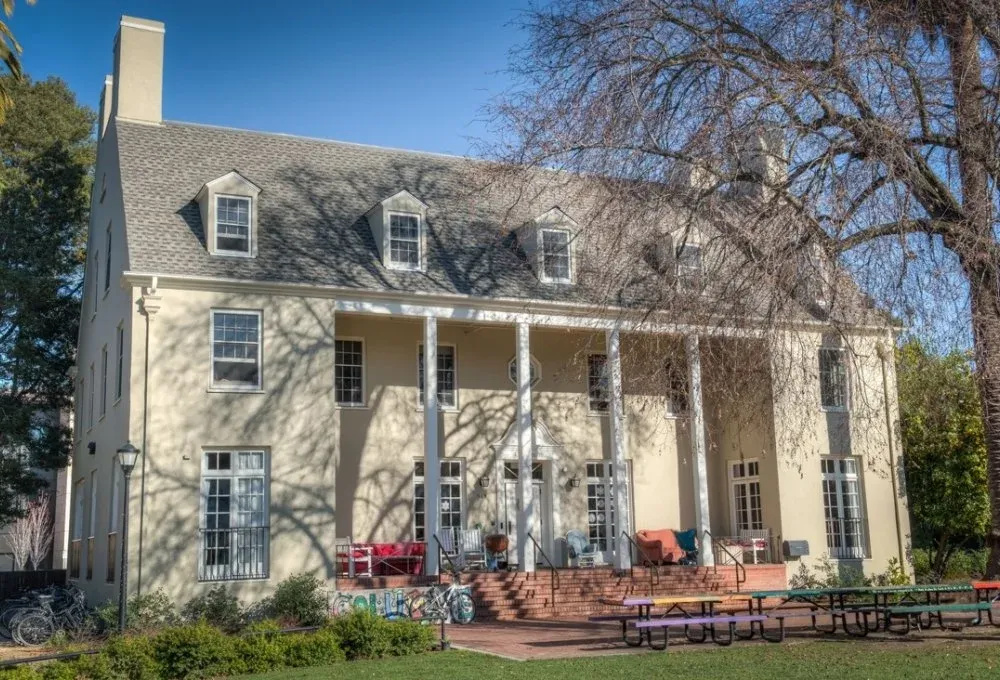Table of Contents
Last May, one of Stanford’s most notorious left-wing co-ops, Columbae, teetered on the edge of extinction. After only four students signed up to live in the house during the 2024-2025 academic year, the university nearly stripped Columbae of its house. However, Stanford’s administration relented, and Columbae managed to recruit enough individuals to fill their ranks. This year’s unrest at Columbae is a sign that this was the wrong decision.
Alongside other co-ops such as Kairos, ideological conformity to left-wing ideals of “liberation” are mandatory to live in Columbae. Since Stanford allowed the house to stay open this year, it has predictably devolved into dysfunctional governance, as theft, open-air drug use, and blatant antisemitism are endemic within it.
Columbae, whose name ironically originates from the Latin word meaning “doves” (signifying peace), was formerly known for its vegetarian kitchen and its focus on activism. The house’s current troubles, however, began after the outbreak of the Israel-Hamas War. In the immediate aftermath of the October 7, 2023 massacre which killed over 1,200 Israelis, Columbae’s residents hung a banner with blood-dripped letters reading “Zionism is genocide,” forcing a student to leave the house, as was reported in The New York Times. Since then, the house has continued to become increasingly socially alienated from regular campus life, as the number of students willing to live there declined precipitously.
According to one student named Duke*, who has multiple friends in Columbae, the source of the house’s problems lies within its radical and erratic Residential Assistants (RAs). Duke took issue with a poster of Yahya Sinwar, the former leader of Hamas, which commemorated him as a revolutionary and martyr. When Duke discussed this issue with Columbae RAs, raising concerns that the house shouldn’t glorify the leader of a terrorist organization, he was quickly banned from the house.
Duke’s banishment occurred without any due process; while Columbae typically makes decisions of this magnitude with a process called “consensus,” where all house members must agree on house decisions, Duke was simply banned under the vague reasoning of “making other residents uncomfortable.” The decision on whether to permanently ban him was ultimately delayed indefinitely, leaving him banned from the house for no clear reason other than opposing terrorism. Duke stated that he is not the only person to have been banned without good cause, and his friends who simply associated with him were also kicked out of the house.
While Columbae banned him for allegedly smoking cigarettes inside the house, Duke told the Review that he does not smoke due to health concerns. Worse yet, this ban happened in spite of open and rampant drug use within the house. Despite the house’s alleged emphasis on social justice, Duke emphasized that antisemitism is allowed to fester openly there, with its left-wing residents openly espousing hate and disdain for Jews. Any opposition to antisemitism or support of Hamas as a “liberation movement” is shut down by ad hominem attacks declaring enemies of the RAs as “fascists,” “Zionists,” and “colonizers,” leading to erratic bans from the house, and selective enforcement of house rules.
Further belying the houses’ troubles was an alleged hate crime against a Muslim student who didn’t subscribe to the houses’ pro-Hamas views. According to Duke, the targeted student remained agnostic to the Israel-Palestine conflict, but disagreed with the house’s glorification of terrorists like Sinwar and the perpetrators of the October 7th attack.
As such, a series of obscenities and insults were scrawled on his door, including accusations that he was a “fake Muslim” and a command to “leave this dorm and live with your Zionist pals.” While the veracity of the incident remains unresolved, this hate crime is emblematic of the house’s abject failure to maintain social order.
RAs have also publicly shamed residents for eating meat, and theft remains a chronic problem in the house according to posts on Fizz, further underlying the severity of social disorder.
Many of Colombae’s issues stem from the fact that, as it was forced to request a second round of sign-ups after only four people signed up to live in it during the initial round of housing applications. Despite Columbae’s unpopularity, it occupies a prime location of campus real-estate. It is a coveted row house, with more spacious rooms than regular campus housing and proximity to Main Quad and White Plaza. Thus, many non-political students who chose Columbae are subjected to the whims of the houses’ leadership. Given the shortage of quality housing options in recent years, Columbae’s continued presence within one of Stanford’s most desirable houses is questionable at best and malicious at worst.
Regardless of politics, it is impossible to overlook the level of social disorder and antisemitism within Columbae. As I called for last year, Stanford has a duty to stop the use of university-owned housing from being occupied by social justice advocates. Transforming Columbae back into a general-purpose row house which appeals to a much wider cross-section of Stanford students would be a much better use of university resources and help ameliorate Stanford’s struggling social scene. While Stanford makes an error in caving to the demands of a loud, activist minority by preserving Columbae, the house’s current troubles and likely termination serve as a powerful reminder to university administrations not to cave to radical demands.





